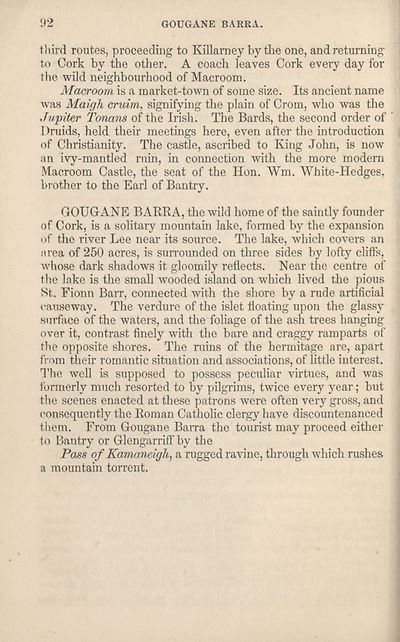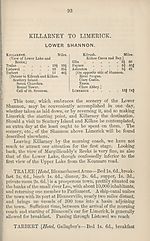Download files
Complete book:
Individual page:
Thumbnail gallery: Grid view | List view

92
GOUGANE BARRA.
third routes, proceeding to Killamey by the one, and returning
to Cork by the other. A coach leaves Cork every day for
the wild neighbourhood of Macroom.
Macroom is a market-town of some size. Its ancient name
was Maigh cruim. signifying the plain of Grom, who was the
Jupiter Tonans of the Irish. The Bards, the second order of
Druids, held their meetings here, even after the introduction
of Christianity. The castle, ascribed to King John, is now
an ivy-mantled ruin, in connection with the more modern
Macroom Castle, the seat of the Hon. Wm. White-Hedges,
brother to the Earl of Bantry.
GOUG-ANE BARRA, the wild home of the saintly founder
of Cork, is a solitary mountain lake, formed by the expansion
of the river Lee near its source. The lake, which covers an
area of 250 acres, is surrounded on three sides by lofty cliffs,
whose dark shadows it gloomily reflects. Near the centre of
the lake is the small wooded island on which lived the pious
St. Fionn Barr, connected with the shore by a rude artificial
causeway. The verdure of the islet floating upon the glassy
surface of the waters, and the foliage of the ash trees hanging
over it, contrast finely with the bare and craggy ramparts of
the opposite shores. The ruins of the hermitage are, apart
from their romantic situation and associations, of little interest.
The well is supposed to possess peculiar virtues, and was
formerly much resorted to by pilgrims, twice every year; but
the scenes enacted at these patrons were often very gross, and
consequently the Roman Catholic clergy have discountenanced
them. From Gougane Barra the tourist may proceed either
to Bantry or Glengarriff by the
Pass o/Kamaneigh, a rugged ravine, through which rushes
a mountain torrent.
GOUGANE BARRA.
third routes, proceeding to Killamey by the one, and returning
to Cork by the other. A coach leaves Cork every day for
the wild neighbourhood of Macroom.
Macroom is a market-town of some size. Its ancient name
was Maigh cruim. signifying the plain of Grom, who was the
Jupiter Tonans of the Irish. The Bards, the second order of
Druids, held their meetings here, even after the introduction
of Christianity. The castle, ascribed to King John, is now
an ivy-mantled ruin, in connection with the more modern
Macroom Castle, the seat of the Hon. Wm. White-Hedges,
brother to the Earl of Bantry.
GOUG-ANE BARRA, the wild home of the saintly founder
of Cork, is a solitary mountain lake, formed by the expansion
of the river Lee near its source. The lake, which covers an
area of 250 acres, is surrounded on three sides by lofty cliffs,
whose dark shadows it gloomily reflects. Near the centre of
the lake is the small wooded island on which lived the pious
St. Fionn Barr, connected with the shore by a rude artificial
causeway. The verdure of the islet floating upon the glassy
surface of the waters, and the foliage of the ash trees hanging
over it, contrast finely with the bare and craggy ramparts of
the opposite shores. The ruins of the hermitage are, apart
from their romantic situation and associations, of little interest.
The well is supposed to possess peculiar virtues, and was
formerly much resorted to by pilgrims, twice every year; but
the scenes enacted at these patrons were often very gross, and
consequently the Roman Catholic clergy have discountenanced
them. From Gougane Barra the tourist may proceed either
to Bantry or Glengarriff by the
Pass o/Kamaneigh, a rugged ravine, through which rushes
a mountain torrent.
Set display mode to:
![]() Universal Viewer |
Universal Viewer | ![]() Mirador |
Large image | Transcription
Mirador |
Large image | Transcription
| Antiquarian books of Scotland > Ireland/Irish > Black's guide to Killarney and the south of Ireland > (104) |
|---|
| Permanent URL | https://digital.nls.uk/118861916 |
|---|
| Description | Thousands of printed books from the Antiquarian Books of Scotland collection which dates from 1641 to the 1980s. The collection consists of 14,800 books which were published in Scotland or have a Scottish connection, e.g. through the author, printer or owner. Subjects covered include sport, education, diseases, adventure, occupations, Jacobites, politics and religion. Among the 29 languages represented are English, Gaelic, Italian, French, Russian and Swedish. |
|---|

